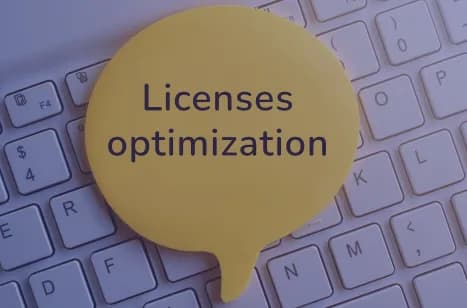Introduction
Dynamics applications are licensed under different models, containing assigned licenses for a named user or device and non-assigned licenses that provide tenant-level access to a feature or service.
In most cases, Dynamics 365 full-user licensing follows the Base Plus Attach Model, which provides a cost-effective way to license one user for multiple applications. To license a core Dynamics 365 business application, customers can buy either a base license or, in many cases, additional or attach licenses.
All the licenses can be divided into two categories: Assigned and Non-assigned. A company can possess and utilize Assigned and Non-assigned licenses simultaneously.
Assigned Licenses
Assigned licenses contribute to a named user or dedicated shared device access to peculiar products. They are distributed into two groups. There are User and Device licenses.
User licenses may also be referred to as Professional or Enterprise licenses. Nevertheless, only one of the versions is installed in one environment. Like the Team Members license, these licenses can provide full or additional user access.
Full-access User licenses are the most common, they are granted roles like salespeople, customer service representatives, and finance employees. They have been designed to supply key personnel with comprehensive functionality.
Licenses for products that guarantee the main business functionality qualify as base licenses. Each base license has one or more additional applications normally used by users in the same roles and qualify as attach licenses for these users.
Base and attach licenses are identical in their key aptitudes and only differ in price. Attach licenses do not contain additional platform privileges. They are licensed to access the platform permissions comprised of the assigned base license.
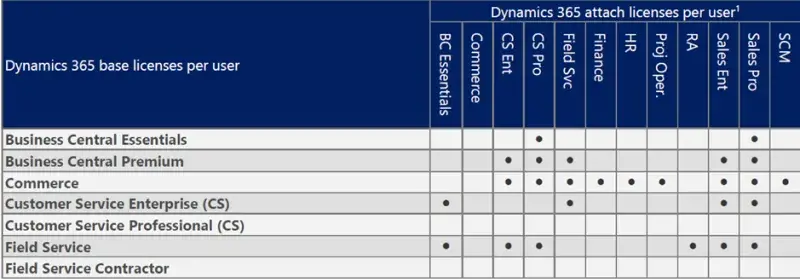
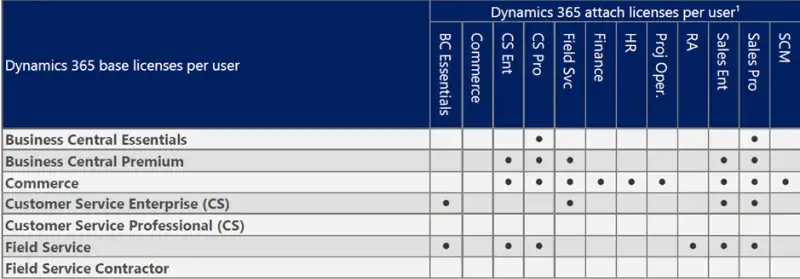
There are also a few types of additional user licenses:
• Device licenses afford access through particular devices by applying assigned, shared,
or individual logins, depending on the application and license. They are ideal for shared
environments like stores or warehouses and guarantee seamless access when multiple
users utilize a single device.
• Operations – Activity license, assigned to a named user, is intended for additional users
who demand more facilities than the Team Members license but do not claim the use
rights of a full user.
• A Human Resources Self Service license, assigned to a single named user, lets the user
manage their own basic HR operations without a full user license for Human Resources.
• Business Central Team Members license, assigned to a named user, supplies read-only
access to certain data and functionality in Business Central deployments.
• Team Members license, assigned to a named user, is for utilizers who are not tied to a
particular function but require read-only access to all data and basic Dynamics 365
functionality for designated scenarios such as expense entry or updating contacts. This
license does not give access to custom applications. Users with the Team Members
license operate with limited table, or ‘entity’, customization options for Team
Members. The Team Members license does not cover custom apps, so if you have
custom apps, Team Members is not a good solution for your user.


The main advantages of having Assigned licenses include the following:
• Full Access licenses are aligned with enterprise or principal user roles for
comprehensive access.
• Device-based licenses with shared device flexibility cater to scenarios where multiple
users utilize the same device.
• Special team member licenses provide a cost-effective solution in the shape of
simplified access for users with basic access needs.
• Admins do not need any license to configure and administer Dynamics 365
applications.
• Base licenses open the door to a specific business application.
• Attach licenses extend user capabilities across multiple applications.
• Users can operate across various applications or functions at discounted rates.
User vs. Device Subscription Licenses
The User Subscription license supplies access for a named user. It is ideal for users interacting with Dynamics 365 apps across multiple personal devices. In addition, it allows individual usage tracking and management of usage on a per-user basis. The Device Subscription license proposes shared device access tailored for scenarios where a device is shared among multiple users. It permits any number of unlicensed users to access the product through the licensed device without tracking individual usage. And, in case of using shared logins there is no individual usage tracking.
Enterprise vs. Professional Licenses
Enterprise licenses provide standard levels with comprehensive and advanced functionality. They suit roles like salespeople, customer service representatives, finance employees, controllers, human resources, and supply chain managers. They are available for Dynamics 365 products: Sales Enterprise, Customer Service Enterprise, Field Service, Human Resources, Finance, Supply Chain Management, Commerce, Project Operations, Remote Assist, Guides, Business Central Premium, and Business Central Essentials. Professional licenses mean streamlined functionality catering to smaller businesses or less complex needs. They are perfect for users with simpler work scenarios.
Non-assigned Licenses
Non-assigned or Unassigned licenses are not assigned to specific utilizers or devices. They grant tenant-level access to a service or a feature, notwithstanding the user or device implicated. Licenses of this type may give full application or cross-application access. Plus, they may guarantee some additional capacity for components, like storage.
There may be different types of Unassigned licenses:
• Full application access licenses are the primary licensing mechanism for specific
products, like Dynamics 365 Marketing, Fraud Protection, and Customer Insights,
which ensure comprehensive application access but are only licensed per tenant.
• Capacity add-on licenses extend capacity limits like data storage, transaction volume,
case routing requests, or customer profiles, based on product and licensing terms.
• Cross-application access licenses, like the Operations – Order Lines license, offer
cross-application access to some Dynamics 365 applications in some situations as a
supplement or alternative to assigned user access.

External Users
External users are customers and third parties who interact with your organization or its
affiliates.
Off-site vendors are not involved in employee-like relationships. Besides, graphical interfaces
for Business Central, Sales, Customer Service, and Field Service may not be accessed by
such utilizers.
Conversely, external users do not require user licenses to access Dynamics 365. Limited
external user access is included with the internal user licenses.

Minimum Quantity Requirements
Certain Dynamics 365 applications have minimum quantity requirements, as outlined in the product terms. These requirements ensure that organizations meet a threshold number of licenses for specific applications. For example, Microsoft Relationship Sales requires a minimum of 10 licenses throughout the subscription or contract term.

Dynamics 365 Dual Use Rights
Dual use rights mean that properly licensed users do not need additional client access licenses (CALs) to access applications hosted in on-premises environments.
Users with Dynamics 365 licenses have use rights equivalent to CALs for accessing equivalent on-premises workloads.
There are some obvious benefits:
• Deployment flexibility
Dynamics 365 offers dual-use rights for deployment in Microsoft’s cloud or a private onpremises or partner-hosted cloud.
• Simultaneous deployment
Users can deploy in multiple environments simultaneously, facilitating scenarios like migration from on-premises to Dynamics 365.
• License equivalence
Properly licensed users do not require additional client access licenses (CALs) to access applications in on-premises environments.
• User and Device rights
Dynamics 365 licenses provide use rights equivalent to a CAL for accessing on-premises workloads, while device use rights align with cloud device use rights.
• Inclusive Server licenses
Dynamics 365 licenses include any server licenses needed for on-premises deployment.
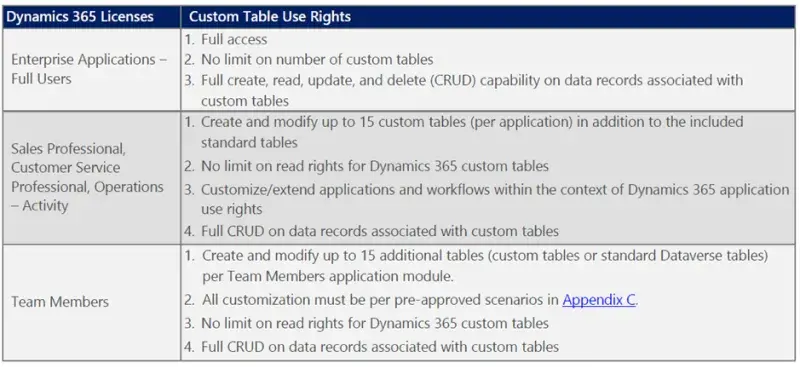
Some Important Dynamics 365 Features
Dynamics CRM Apps
Dynamics 365 CRM thrives on key applications designed for distinct business functions. The main D365 CRM Apps consist of D365 Sales Enterprise & Professional, D365 Field Service, D365 Customer Insights, D365 Customer Service Enterprise & Professional, and Dynamics 365 Project Operations (part of ERP and CRM). The core Dynamics CRM Apps satisfy particular business needs.
The central aspects of licensing include a user subscription license with a monthly cost per user. Certain apps offer a device subscription license, which is an excellent match for scenarios where multiple users share a single device. The user subscription licenses ensure personalized access to functionalities, and the device subscription licenses provide versatility for shared device usage.
Dynamics 365 ERP Apps
Dynamics 365 offers a suite of powerful ERP applications for comprehensive business management. These include Dynamics 365 Commerce, Dynamics 365 Finance, Dynamics 365 Supply Chain Management, Dynamics 365 Human Resources, and Dynamics 365 Project Operations (part of ERP and CRM).
MRS includes Sales Enterprise and LinkedIn Sales Navigator Advanced Plus. It helps sales professionals build the relationships they need to harness the power of relationship selling.
Additional add-ons
Customer Service add-ons provide expanded functionality for Enterprise and Professional licenses. There are several types of them:
• Sales App Add-ons are part of Premium licenses and are available as a separate purchase for users with Sales Enterprise licenses.
• Customer Service Professional Add-ons contain Unified Routing, Intelligent Voice Bot, and Call Intelligence Minutes.
• Customer Service Enterprise Add-ons consist of Chat, Digital Messaging, Customer Service Insights, and Voice Channel.
Dynamics 365 Sales
Dynamics 365 Sales Premium
Sales Premium includes Sales Enterprise feature permissions, Sales Insights automation, and AI offerings. It supplies users with advanced AI functionalities.
Sales Premium takes the Sales Enterprise capabilities and accelerates engagement and decision-making with prebuilt and embedded business insights that are easy to act upon.
Microsoft Relationship Sales (MRS)
MRS includes Sales Enterprise and LinkedIn Sales Navigator Advanced Plus. It helps sales professionals build the relationships they need to harness the power of relationship selling.
Sales Insights
It is pre-built into Sales Premium licenses. It is a budget-friendly add-on for Sales Enterprise and Relationship Sales licenses. It is not available for Sales Professional licenses.
The benefits of Sales Insights include tenfold increased value and productivity of the Dynamics 365 Sales app, better understanding of leads and opportunities, and empowering sellers to prioritize work effectively.
So, to maximize your D365 Sales, you can incorporate Sales Insights for a comprehensive sales experience, leverage advanced features to stay ahead in the competitive landscape, drive productivity, understand leads, and prioritize relationships effectively.
Licensing details:
• Predictive Scoring (lead and opportunity)
• Pipeline Intelligence
• Predictive Forecasting
• Notes Analysis
• Business Card Reader
• Conversation Intelligence
• Relationship Analytics
• Connection Insights (who knows whom)
• Assistant Studio
• Sales Accelerator

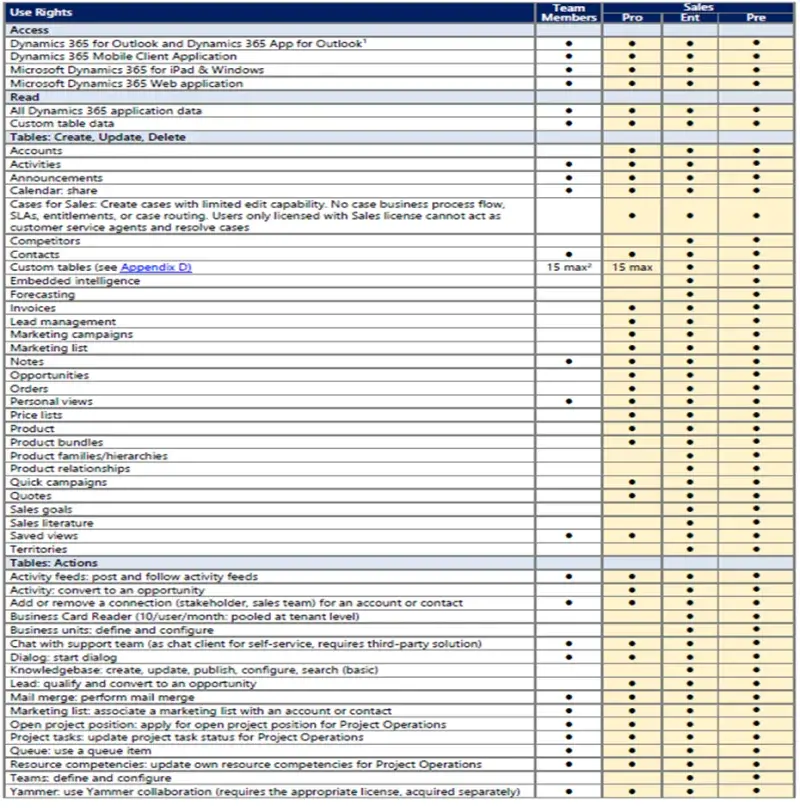
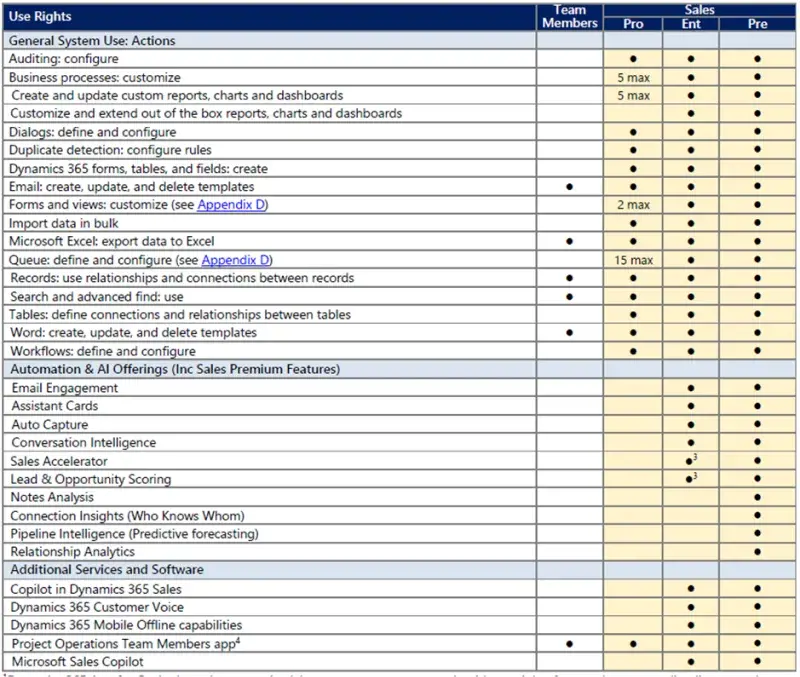
Dynamics 365 Customer Insights
The new Customer Insights license includes rights to two applications: Dynamics 365 Customer Insights – Journeys and Dynamics 365 Customer Insights – Data.
Customer Insights is licensed per tenant and permits the installation of the Customer Insights – Journeys and Customer Insights – Data apps in four different environments for each app. It also contains a base capacity of 10,000 interacting users for interactions through the Customer Insights – Journeys app, 100,000 aggregated users for profile aggregation through the Customer Insights – Data app, and default Dataverse capacity.
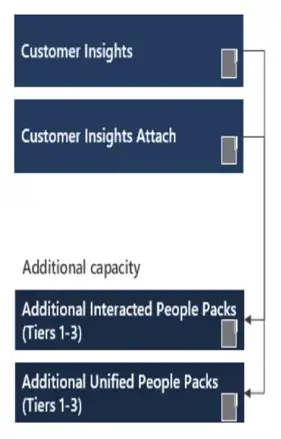
Licensing details:
• Predictive Scoring (lead and opportunity)
• Pipeline Intelligence
• Predictive Forecasting
• Notes Analysis
• Business Card Reader
• Conversation Intelligence
• Relationship Analytics
• Connection Insights (who knows whom)
• Assistant Studio
• Sales Accelerator
Customer Insights Capacities
Customer Insights capacities are based on Interacted People, Active Contacts, and Unified People or Profiles. Interacted People refers to any Dataverse tables (e.g., contact, lead, account, insights profile) that can be interacted with through an inbound or outbound channel within twelve months. Each utilizer is entitled to 10x interactions. Interactions not made within the past twelve months are not counted towards the quota limit.
Unified People come across as uniquely identified individuals created via defined data source sets from multiple systems.
Additional Capacity
It is available for both applications, can be purchased independently based on intended use, and includes capacities for data-scheduled refreshments and environments. The add-on capacity purchase does not affect segment, KPI, or data scheduled refresh allotments.

The eligibility criteria for Customer Insights attach pricing include the following (for 10 or more licenses of specific Dynamics 365 products):
• Customer Service Professional
• Customer Service Enterprise
• Sales Professional
• Sales Enterprise
• Sales Premium
• Field Service
• Finance
• Supply Chain Management
• Commerce



Storage in Dynamics 365
Dynamics 365 introduces a nuanced approach to storage with three different storage types. The base license, designed to consider your needs, grants default capacity shared across the tenant. The default capacity is not cumulative, so additional licenses do not increase the initial default capacity.
The types are the following:
• Dataverse Database Storage, which manages table definitions and data. The default capacity is included in the base license.
• Dataverse File Storage, which stores attachments, including files and emails. The default capacity is also included in the base license.
• Dataverse Log Storage, which records changes to tables and attributes over time for analysis. The default capacity is also included in the base license.
Acquiring Additional Storage
Additional storage can be obtained by adding users or purchasing extra capacity licenses.
Organizations transitioning from the previous customer engagement plan model must evaluate their storage needs carefully.
Attach licenses do not include additional capacity entitlements. They are licensed to access the initial capacity entitlements included with the first base license.
Conclusion
In conclusion, here are some simple and valuable tips on how to choose the correct CRM set of licenses:
• Clearly formulate your organization’s CRM needs and the functionalities required for effective customer engagement.
• Identify CRM user roles and match them with appropriate CRM license types for costeffectiveness.
• Choose a CRM licensing model that allows scalability as your CRM needs evolve.
• Periodically review the range of freshly updated CRM licenses to align with evolving
CRM strategies and customer engagement goals.
• Collaborate with a Microsoft partner to ensure the best pricing for your licenses.
• Use specific D365 tools and add-ons to optimize your CRM licenses, ensuring efficient
resource allocation.
UDS Systems is an authorized Microsoft CSP (Cloud Solution Provider) offering services, including licensing, tailored IT solutions, and dedicated support. You can contact our company's representatives at any time and get detailed advice on any issue you are interested in. In addition, you can benefit a lot from using the UDS License Calculator to choose the licenses that perfectly match your company’s demands.
You can see the webinar on this topic by following the link:
